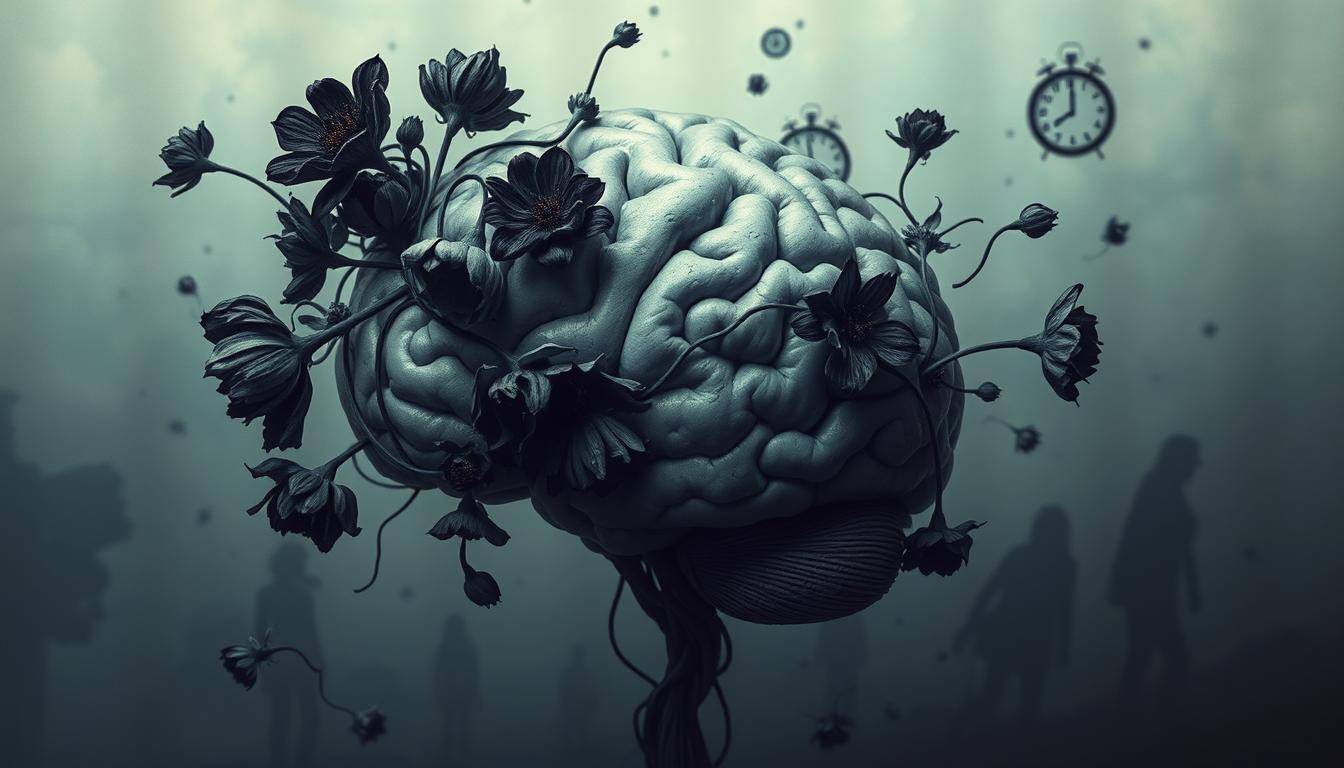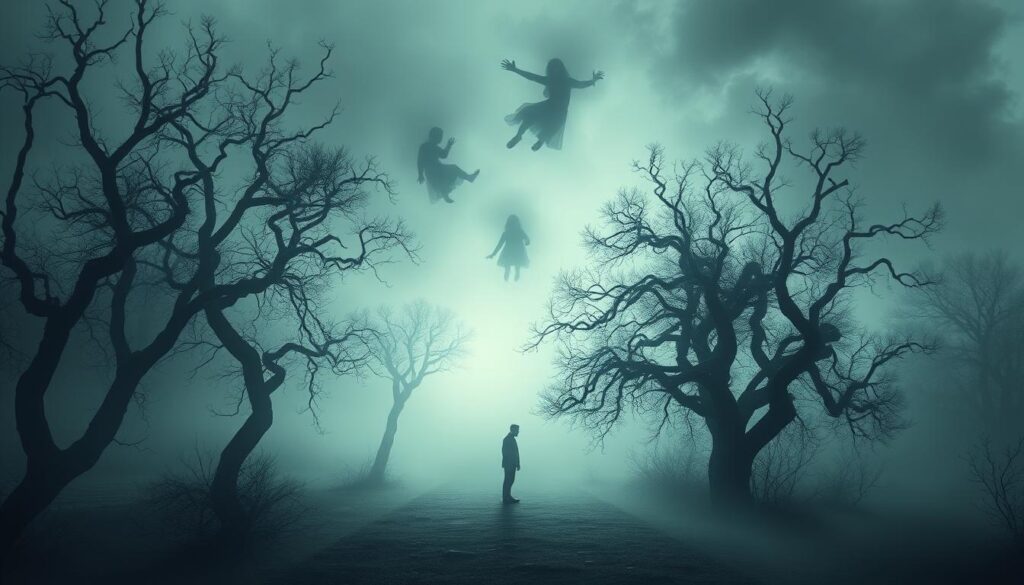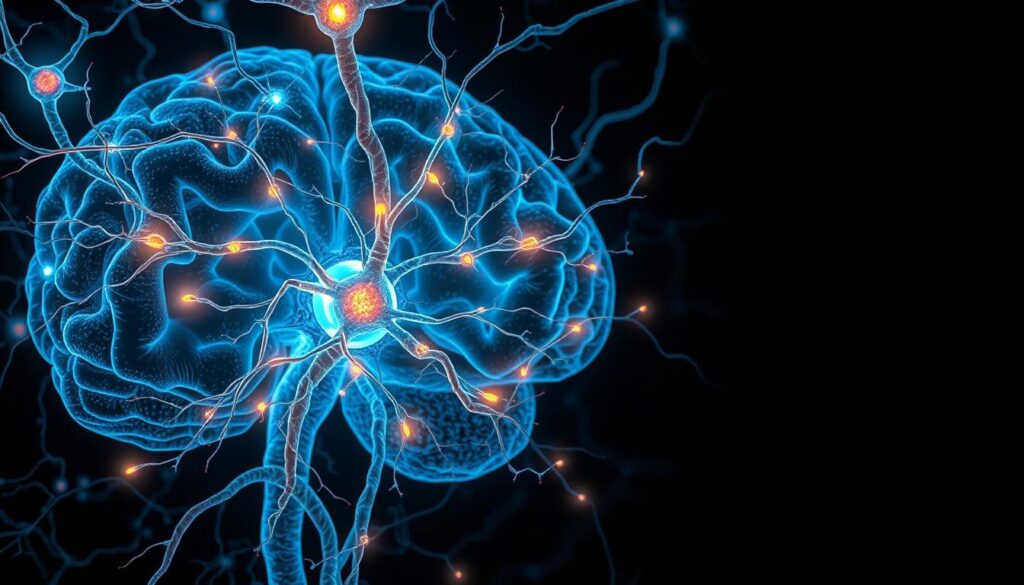- April 17, 2025
Welcome to Dementia World elderly home services



It’s surprising to learn that about 50% of people with late-onset depression also have cognitive issues. This shows a strong link between depression and dementia. Mental health is not just a side effect of cognitive decline. It plays a big role in the start and growth of neurocognitive disorders.
Depression can be a sign of dementia and also a cause of losing mental abilities. Knowing this is key to treating and preventing these conditions. It helps us find better ways to help those at risk.
Depression and dementia are big issues in mental health, affecting many people. About 30-40% of those with dementia also have depression. This shows how these conditions often go together.
Depression can make things worse for people with dementia. It adds to the challenges they already face.
In care homes, over 40% of residents might feel depressed. The risk of suicide is higher for people with dementia, often in the first few months after they’re diagnosed. This highlights the need for mental health checks in older adults.

People who’ve had depression before are more likely to feel it again with dementia. Depression in older adults can look different, like more agitation and worry about health. This makes it harder to tell if someone has depression or dementia.
It’s important to know how to treat these mental health issues. But, antidepressants don’t work as well for people with dementia. Only 50% to 60% see some improvement.
Regular exercise can help mood by 20-30%. Eating well can cut depression symptoms by 25%. These small changes can make a big difference.
Things like reminiscence therapy can really help. It can improve mood in up to 60% of people. As we learn more about depression and dementia, we need better mental health care more than ever.
Depression is a common mental illness that affects many people. It can make life feel very hard. People with depression often feel sad, tired, and lose interest in things they used to enjoy. They might also find it hard to focus and feel worthless.
There are many reasons why someone might get depression. It can be due to genes, biology, or life events. Things like losing someone close or facing hard times can trigger it. Knowing this helps us understand why depression is a serious issue.

Studies show a strong link between depression and dementia. People with depression are more likely to get dementia. Looking at health records of over 1.4 million Danes, we see that many got depression and then dementia. This shows how important it is to treat depression.
This link is true for both men and women, but it’s stronger for men. Going to the hospital for depression a lot can raise the risk of dementia. Each time someone is hospitalised, the risk goes up.
It’s key to know the signs and causes of depression. This knowledge helps us find better ways to help people. With depression affecting so many, finding solutions is more urgent than ever.
| Statistic | Value |
|---|---|
| Individuals diagnosed with depression diagnosed with dementia | 2.41 times more likely |
| Health records analysed | 1.4 million Danes |
| Individuals with depression identified (1980-2018) | 246,500 |
| Dementia diagnoses in those with depression | 14,000 |
| Dementia diagnoses in comparison cohort | 38,650 |
The link between depression and dementia is complex. Symptoms of both conditions can overlap. Depression might be an early sign of cognitive issues and a risk factor for dementia.
Studies show a strong connection between depression and cognitive decline. People with depression may experience significant brain function loss over time.
About 20% of people over 60 have depression. This group is at higher risk of getting dementia. It’s important because many people with depression also face cognitive problems.
Research shows that depression increases the risk of dementia. The risk is 50% to 100% higher than for those without depression.

Meta-analyses suggest depression raises the risk of cognitive decline. The risk is 1.5 to 2 times higher for those with depression. In Alzheimer’s patients, 30% to 50% also have depression.
Longitudinal studies show that 55% of those with late-life depression may develop dementia in five years. Treating depression early can slow cognitive decline. Early detection and treatment are key to preventing dementia.
The connection between depression and dementia highlights the need for better care for older adults. They often face both conditions, making early intervention critical.
| Statistic | Details |
|---|---|
| Risk Increase | Individuals with depression have a 50% to 100% increased risk of developing dementia. |
| Prevalence in Alzheimer’s | 30% to 50% of patients with Alzheimer’s disease also experience depression. |
| Late-Life Depression | 55% of individuals with late-life depression may develop dementia within five years. |
| Cognitive Decline Odds | The odds of cognitive decline in individuals with depression are 1.5 to 2 times higher than those without. |
The link between depression and dementia is complex. It involves many biological processes. By understanding these, we can see how depression might affect our brain’s function. Studies suggest that treating depression could help prevent dementia.
Research has found several ways depression and brain decline are connected. Key areas include:
These findings show why we need more research. It’s vital to understand how depression affects the brain. Treating depression could change the brain’s pathways, helping prevent dementia.
| Neurobiological Pathway | Impact on Cognitive Decline |
|---|---|
| Vascular Disease | Reduces blood flow, leading to brain damage. |
| Glucocorticoid Changes | Causes atrophy in the hippocampus, affecting memory. |
| β-Amyloid Accumulation | Linked to the progression of Alzheimer’s disease. |

The link between depression timing and dementia risk is fascinating. Studies show that when depression strikes, it can affect dementia risk later in life. Knowing this helps us prevent and treat both conditions better.
Depression in younger years can triple dementia risk. This shows why treating depression early is key. On the other hand, depression in older age also raises dementia risk, but the link is more complex.
1 in 5 people will have a depressive episode. After 65, dementia risk doubles every five years. By 90, the risk jumps to 50%. Depression is common in Alzheimer’s and vascular dementia patients, affecting up to 50%.

Recent studies on late-life depression and dementia found 12 out of 16 were prospective. Six of these showed a 2 to 5-fold dementia risk increase. One study found a 70% dementia risk increase over 17 years.
Earlier-life depression also raises Alzheimer’s risk by 20% for each symptom. Severe depression can nearly triple dementia risk.
This shows we need to tailor treatments based on when depression occurs. This approach can better manage dementia risk.
Treating depression is key to lowering dementia risk. Studies show depression can double the risk of getting dementia. A review of 27 studies found a strong link between depression and dementia.
People treated for depression have a lower risk of dementia. A big study with over 46,000 participants showed this. Those who got therapy were less likely to get dementia.
Cognitive behavioural therapy helps by reducing depression. This, in turn, lowers dementia risk. But, some depression meds, like anticholinergics, might raise dementia risk. It’s important to manage this carefully.
Improving lifestyle is also vital. Exercise, eating well, and staying connected are key. These activities help fight depression and lower dementia risk.
It’s very important to tackle depression. Studies show treating depression can prevent dementia. The aim is to improve life quality and fight dementia.
| Factor | Dementia Risk Increase |
|---|---|
| Depression | 100%+ |
| Hypertension | 2% |
| Diabetes | 1.2% |
| Obesity | 0.8% |
| Physical Inactivity | 2.6% |
This article has shown how depression and dementia are closely linked. Studies found that people with depression are more likely to get dementia. They found a nearly twofold risk.
Treating depression early can help prevent cognitive decline. This shows why managing mental health is so important.
Depression in older adults increases the risk of Alzheimer’s and vascular dementia. Research shows that treating depression early can reduce this risk. Each year without depression can lower the risk by 8.4%.
We need more research to understand these connections better. This is key to improving treatments. The link between depression and dementia is complex and needs more study.
Depression can increase the risk of getting dementia. It can also be a sign of cognitive decline. It’s key to know that depression and dementia can happen together but are not the same thing.
Symptoms of depression include feeling sad all the time, being very tired, and not enjoying things anymore. These can make diagnosing dementia harder.
Having depression early in life can greatly increase the chance of getting dementia later. This risk can be two or three times higher.
Depression and dementia may be linked through vascular disease and changes in the brain. This includes hippocampal atrophy and the buildup of β-amyloid plaques. Treating depression might help prevent dementia.
Treating depression can lower the risk of dementia. This is true for both medication and therapy. Making lifestyle changes can also help keep the mind healthy and reduce dementia risk.
Mental health screenings are essential. They help find people at risk for depression or dementia. This allows for early action and better management, which can slow down cognitive decline.